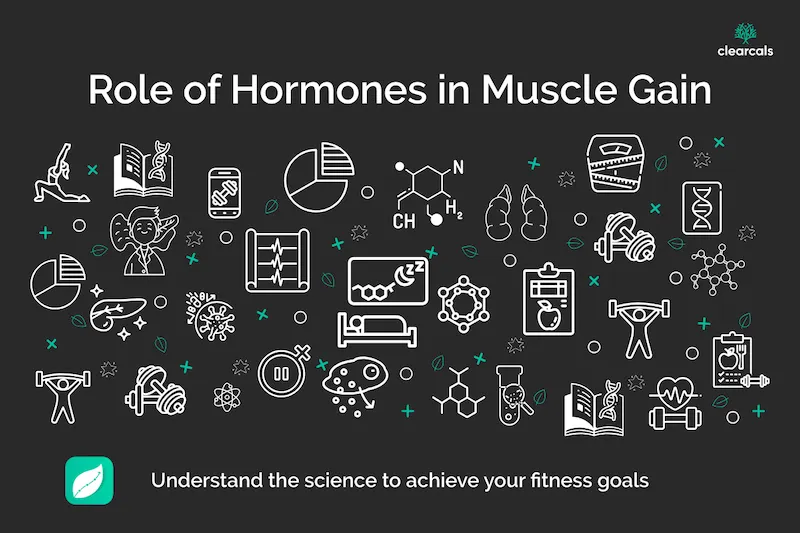Looking for a Personalized Diet Plan?
The Role of Hormones in Muscle Gain

Muscle gain, scientifically known as muscle hypertrophy, is a complex physiological process influenced by various factors, including genetics, nutrition, exercise, and importantly, hormones.
Hormones play a pivotal role in regulating muscle growth, repair, and overall muscular adaptation to exercise.
In this blog, we delve into the key hormones involved in muscle building and how they impact your fitness journey.
1. Testosterone
Anabolic Effects: Testosterone is a primary hormone responsible for muscle growth and development in both men and women. It promotes protein synthesis, which is essential for muscle repair and hypertrophy.
Strength and Performance: Higher levels of testosterone are associated with increased strength and power output during resistance training exercises.
Natural Production: Produced primarily in the testes (in men) and ovaries (in women), testosterone levels can be influenced by factors such as age, genetics, exercise intensity, and sleep quality.
2. Growth Hormone (GH)
Muscle Repair: Growth hormone plays a crucial role in muscle tissue repair and growth by stimulating the production of insulin-like growth factor 1 (IGF-1), which promotes protein synthesis and enhances muscle hypertrophy.
Fat Metabolism: GH also aids in fat metabolism, helping to mobilize and use stored fats for energy, which indirectly supports muscle growth by optimizing body composition.
Secretion: Growth hormone is released by the pituitary gland, with secretion increasing during deep sleep and in response to exercise, stress, and fasting.
3. Insulin-like Growth Factor 1 (IGF-1)
Muscle Growth: IGF-1 is a key mediator of growth hormone's effects on muscle cells, promoting cell growth, differentiation, and proliferation.
Anabolic Effects: It enhances the uptake of amino acids and glucose into muscle cells, supporting protein synthesis and muscle hypertrophy.
Regulation: Production of IGF-1 is stimulated by growth hormone and influenced by factors such as nutrition, exercise, and sleep patterns.
4. Cortisol
Stress Hormone: Cortisol, often referred to as the stress hormone, has both catabolic (muscle breakdown) and anti-inflammatory effects.
Impact on Muscle: Elevated cortisol levels can inhibit protein synthesis and promote muscle breakdown, especially under conditions of chronic stress or overtraining.
Balance: While cortisol is essential for regulating metabolism and responding to stress, excessive levels can negatively affect muscle growth and recovery.
5. Insulin
Anabolic Effects: Insulin is primarily known for its role in glucose metabolism, but it also has anabolic properties that support muscle growth.
Nutrient Transport: Insulin facilitates the uptake of glucose and amino acids into muscle cells, promoting glycogen storage and protein synthesis after workouts.
Timing: Post-exercise insulin response helps shuttle nutrients into muscles for recovery and growth, making post-workout nutrition crucial for maximizing muscle-building potential.
6. Estrogen and Progesterone (in Women)
Muscle Adaptation: Estrogen and progesterone influence muscle metabolism and adaptation to exercise in women.
Lean Mass: Higher estrogen levels can contribute to lower body fat and maintenance of lean muscle mass.
Effects: Fluctuations in these hormones throughout the menstrual cycle can affect energy levels, recovery, and exercise performance in women.
Conclusion
Hormones play a multifaceted role in muscle building, regulating processes such as protein synthesis, muscle repair, and energy metabolism.
Understanding how these hormones interact and respond to factors like exercise, nutrition, and sleep is crucial for optimizing muscle growth and performance.
To support your muscle-building goals, focus on strategies that naturally enhance hormone levels through consistent resistance training, balanced nutrition (including adequate protein intake), quality sleep, and stress management.
By prioritizing these factors and maintaining a holistic approach to fitness, you can harness the power of hormones to achieve sustainable muscle development and overall health.





